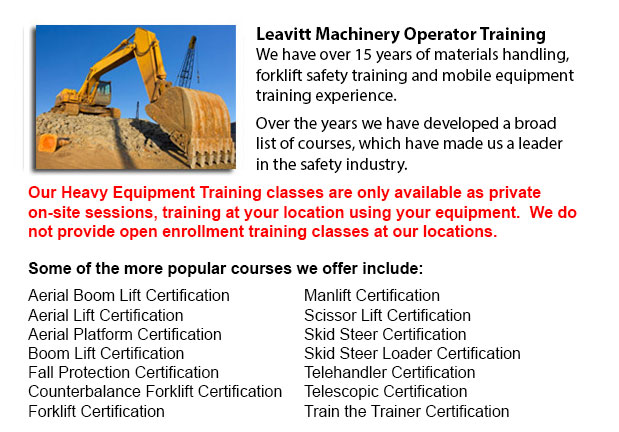
Heavy Equipment Operator Certification Vancouver - The heavy equipment operator is a person who manipulates the controls and drives different types of large machinery. Heavy equipment is most frequently used on construction sites to deliver supplies to the site or to move earth, getting the site ready for certain construction tasks. Heavy industrial equipment can consist of cranes, backhoes, excavators and bulldozers. The operator needs to follow safety procedures as he maneuvers the machinery to finish his task. He can be the sole equipment operator on the jobsite or as part of a team.
Depending on the nature of the job at hand, the kind of construction machine which a heavy equipment operator utilizes varies. Every kind of machinery is made to do particular jobs in the most efficient method common to the construction industry. Different kinds of machines are small enough to be utilized inside of warehouses or within plants, and may be specially designed to move boxes and pallets. Larger equipment is customarily used outdoors to grade land and clear areas to prepare for construction.
There are various projects that require the skill of a heavy equipment operator, such as public works projects and endeavors of privately owned companies. Tasked carried out by public works offices could comprise road construction and the building of bridges. There are numerous other publicly funded projects which comprise dam construction, airport runways, levees, power plants and municipal structures. Private projects could include the construction of malls, office buildings, retail stores and industrial parks.
Small scale tasks will often require heavy machinery to be utilized in huge industrial spaces or in commercial buildings. The equipment which would be utilized in this particular case, consists of pallet jacks, forklifts and cherry pickers. Trenchers and backhoes are normally available in different sizes appropriate for jobs needing powerful and less bulky machinery.
Operators of heavy equipment will be required to be certified by their regional or local agency. A lot of these operators are cross-trained and certified to operate a lot of different models of heavy machinery. Others choose to specialize in operating only one kind of machine and only require periodic updates on their operating permit certifications.
The employers working in this business operating heavy machines will typically be trained by taking a formal apprenticeship course or by receiving on-the-job training by their companies or unions. It is necessary that employers hire completely-trained heavy equipment operators to adhere to local rules and adhere to local and regional laws regarding job situations and worker safety.
-
Telehandler Ticket Vancouver
Telehandler Ticket Vancouver - The telescopic handler or telehandler is a frequently used equipment in agricultural and industrial applications. This equipment is similar in appearance to a forklift and also functions in a similar way, even if teleha... More -
Forklift Operator Certification Vancouver
Forklift Operator Certification Vancouver - Forklift operator certification is usually needed for employees working within industrial, warehouse or construction environments to guarantee the safe operation of forklifts. Workplace training need to fol... More -
Certified Fall Protection Training in Vancouver
There are high numbers of injuries at work linked to falling and a lot of fall-related deaths reported each and every year. The majority of these instances might have been avoided with better training, better measures in place, and by correctly equip... More -
Forklift Training Course Vancouver
Forklift Training Course Vancouver - CSA and OSHA establish criteria for forklift safety training which meets existing standards and regulations. Anyone planning to utilize a forklift is needed to successfully complete safety training prior to using... More -
Overhead Crane Certification Vancouver
Overhead Crane Certification Vancouver - The overhead crane certification course is a program that is designed to assist trainees, even if they have literacy or language restrictions. The course comprises a practical hands-on training session and a c... More -
Forklift Instructor Training Vancouver
Forklift Instructor Training Vancouver - Forklift Instructor training certification is recommended for forklift operators who would like to become instructors. To qualify for forklift instructor training, operators must be able to prove they possess... More -
Crane / Overhead Crane / Truck Mounted Crane / Hydraulic Cranes Training in Vancouver
Overhead cranes are likewise referred to as bridge cranes. They are actually a type of crane which comprises a hook and line apparatus which runs along a horizontal beam which runs along two widely separated rails. Lots of overhead cranes can be foun... More -
Scissor Lift Safety Training Vancouver
Scissor Lift Safety Training Vancouver - A scissor lift is a kind of platform lift that moves vertically. The lift table is moved in a vertical motion because of criss-cross folding supports which are linked in what is referred to as a pantograph. Th... More

Forklift Training Vancouver
TOLL FREE: 1-888-254-6157
24389 Fraser Highway
Langley, British Columbia
forklifttrainingvancouver.com
Email Us
About Us


